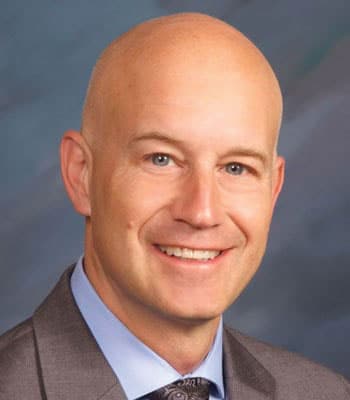Kelly Jones leads Loveland’s economic development plan
LOVELAND — Kelly Jones of Loveland led the charge to update the city of Loveland’s economic development plan for the next five years, working closely with staff and the city’s strategic partners.
The city’s 2023-2027 Economic Development Strategic Plan, “Re-building the Backbone of Our Economy,” passed unanimously by the Loveland City Council in September. It revisits the core principles of economic development packaged as TRACER — Tourism; Retention, Attraction, and Creation of jobs/Entrepreneurship; and Expansion and Redevelopment of Businesses.
“The focus is rebuilding and strengthening the backbone of our community,” said Jones, economic development director for the city. “We updated our last five-year strategy approved in 2017. We needed to do a refresh.”
Jones worked with city staff, a business stakeholder working group, results from a business survey and feedback from a community town hall to make current the city’s Economic Development Strategic Plan.
“I tried to take all that feedback and formulate a strategy,” Jones said. “I’m one that doesn’t like strategy that’s too mired with too many tactics and details. I would rather we pick the high level things that we can accomplish.”
Jones combined the feedback with her 20-plus years of experience to help develop the strategic plan, taking an approach that’s intuitive, in part, because of her experience in economic development, she said.
“The latest strategic plan is more of a refinement of the previous plan that Kelly prepared, than a re-write. The original goals are still very relevant, so most were carried over,” said Scott Schorling, business development project manager for the city of Loveland. “This plan reflects these updates, as well as brings new tactics to accomplish them.”
Jones has an “amazing vision” and “is dedicated to providing a collaborative environment that is based on empathy, humor and professionalism,” said Steve Adams, Loveland city manager.
“Kelly has changed the landscape of Loveland by bringing in both large businesses that offer primary jobs and small companies that have thrived in our city,” Adams said. “Her deep understanding of the field of economic development, project management and negotiations have assisted the city in gaining critical redevelopments and new job opportunities for our community members.”
Jones and her team reviewed economic development data; developed a Strengths, Weaknesses, Opportunities, and Threats (SWOT) analysis; and outlined 12 strategies within the TRACER framework with specific tactics to carry out those strategies.
“We had a strong focus on talent and workforce in our last strategy, but our staff isn’t the point (of contact) on that,” Jones said.
Since workforce strategies are now led by Larimer County’s Economic and Workforce Development, as well as local community colleges and Thompson School District, the updated plan focuses on strategies for talent attraction and retention.
“We support the work of those agencies and schools, but we can’t take credit for the initiatives. We folded (the work) into other categories to support those agencies,” Jones said.
In the area of retention and expansion, the strategic plan focuses on creating and fostering a business climate that helps retain key employers, while also monitoring, identifying and supporting local business expansions. For attraction, the focus is on promoting Loveland as one of the top communities to locate a business, increasing brand awareness through marketing strategies and attracting primary employers to Loveland, such as encouraging the building of satellite offices here.
“Communities and economies are built on primary jobs,” Jones said. “These are small companies all the way up to the largest employers.”
By focusing on retaining and expanding primary employers, the city can import new wealth into the community balanced with retail and service jobs that trade wealth and retain local dollars, Jones said. Tourism also adds to a community’s wealth by increasing the sales tax base from the products and services tourists purchase during their visits and stays in Loveland, she said.
“The overall vision … is growing a diverse economic base and creating ample employment opportunities for those who want a job,” Jones said.
Jones helps “keep Loveland top-of-mind for primary employers” by leveraging the relationships she already had through her work in Loveland, Fort Collins and Greeley, said Cindy Mackin, director of Visit Loveland, operated by the city of Loveland.
“Kelly has been the key force in moving the needle of Loveland’s economic development success,” Mackin said. “She came into the department and truly established her proactive approach to economic development very quickly, taking on internal challenges and processes and changing them in order to make it a more business-friendly environment. … I love that she wanted to be proactive in telling Loveland’s business story to the rest of the world in order to attract primary employers.”
Schorling agrees with Mackin.
“Kelly is extremely well connected, and she uses her network to respond to the needs of businesses at all levels of expansion,” Schorling said. “Her background in both the public and private sectors allows her to unlock resources for businesses that can be gathered only from years of building relationships.”
Jones also is involved on the city’s executive team to develop strategies for the economic development department, tourism, Visit Loveland and the Loveland Visitor Center.
“I’ve done more to be a strategist for other city departments, helping with larger decisions that affect the city and relate to economic development,” Jones said.
Within her own department, Jones has seen a few successes and challenges. Some of her successes include recruiting a number of small and midsize companies in the technology sector, bringing in the Amazon robotics sorting facility, aiding the Northern Colorado Regional Airport with its strategy, and assisting in the repurposing of the former Hewlett Packard campus into a multi-business and agency complex housing the Warehouse Business Accelerator nonprofit and the Lightning eMotors business.
One of the challenges Jones has seen is the negative social media comments coming from a contingency of Loveland residents about not trusting government.
“I worry about that, because regardless of the amount of transparency we’re giving, there is a lack of trust. Outside people may be considering moving to Loveland and see this distrust of government and not move here,” Jones said. “What I can do about that is continue to do good work … and publicize it, so the positive noise outweighs the negative concerns.”
Jones works with several staff members who tend to be risk averse and aims to infuse an entrepreneurial spirit and encourage innovation, doing “everything better and faster for economic development,” she said. Her team consists of four to five key employees who could put in 20 hours a day to carry out the department’s work, so the strategic plan is a way to be purposeful with their time, she said.
“I try to keep redirecting when I see them go off vision, spending too much time on a project without a huge ROI,” Jones said. “I’m strategic. I make decisions extremely quickly. … I try to be very positive and have fun.”
Jones has held several other positions in her 22-year career working for government, private large firms and nonprofits. Her work includes serving as executive director of the Warehouse, vice president of the Northern Colorado Economic Development Corp. and chief operating officer of the Rocky Mountain Innosphere. She also held the positions of public and policy manager at the city of Fort Collins, economic development manager for the city of Greeley and executive director of the Loveland Business Development Center.
Jones has a bachelor’s of science degree in business administration from Colorado State University, which she earned in 1990. She has an Economic Development Finance Certificate from the National Development Council, earned in 2005, and Economic Development Institute Certification from the University of Oklahoma, earned in 2013.
Source: BizWest





